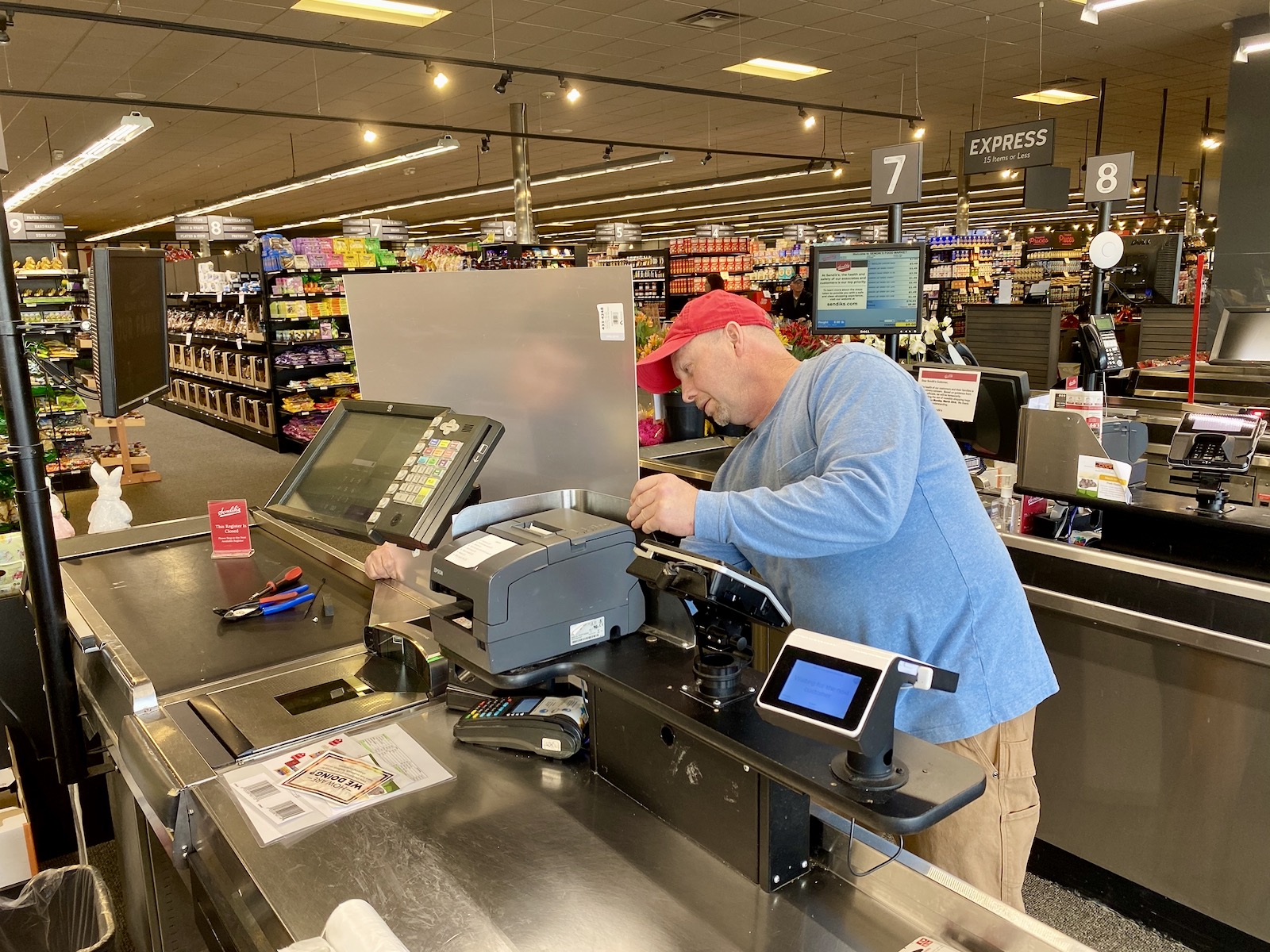The coronavirus pandemic has changed our everyday life, but it doesn't need to change who we are. So, in addition to our ongoing coverage of the coronavirus, OnMilwaukee will continue to report on cool, fun, inspiring and strange stories from our city and beyond. Stay safe, stay healthy, stay informed and stay joyful. We're all in this together. #InThisTogetherMKE
Our world has changed. And, with the "Safer at Home" order in effect, they are likely to change even more. We are being forced to rethink, reevaluate and reconsider practices that we’ve grown to take for granted. That includes grocery shopping.
Area grocers are doing everything they can to keep you safe, including suspending self-service food bars, bulk bins and bakery areas and increasing the frequency of cleaning in high touch areas throughout the stores.
A number of local stores – including Outpost Natural Foods and Sendik’s – have (or are in the process of) installing plexiglass partitions at check-outs to prevent unnecessary contact between employees and customers.
But their actions aren’t enough.

Shoppers have to begin taking their shopping experiences seriously as well. And that means following rules and protocols to keep themselves – and everyone around them – safe.
This is important for so many reasons, not the least of which is: If stores cannot maintain safety for both customers and employees, they will close completely.
Here’s what you need to know.
Rules for shopping
As a start, follow these tips gleaned from both CDC guidelines and information from local grocery stores. Remember, these guidelines are not only to keep you safe, but to protect employees and other customers as well.
Before you shop:
- Consider switching over to grocery delivery or pick-up services. Platforms like Instacart service a variety of local stores including Aldi, Outpost Natural Food Cooperative, Fresh Thyme, Metcalfe’s Market and Pick 'n Save. Some grocers, like Sendik’s also offer express curbside pick-up or express delivery. You can avoid contact by asking the person delivering the groceries to leave them at your door. Don’t forget to tip.
- Stay home. If you are sick (any kind of sick), or feeling like you might be getting sick, DO NOT go to the grocery store.
- Limit your shopping trips. Shop only when you have a full list instead of making daily stops for just an item or two.
- Make a list so you can get in and out of the store more quickly and efficiently
- Try to shop during non-prime times when the store is less crowded. This might be inconvenient for you, but it’s important.
- If you are a senior or at high risk for contracting COVID-19, shop during special allotted times at area supermarkets (see list below)
- If you are NOT a senior or at high-risk for contracting COVID-19, DO NOT shop during dedicated shopping hours reserved for high risk audiences (that’s just rude).
- Limit shopping to one household member at a time whenever possible. Grocery shopping should not be a group outing.
- Leave re-useable bags at home; stores have temporarily suspended their use for safety reasons.

At the store:
- Use hand sanitizer when entering the store and wash your hands or use hand sanitizer again as soon as possible after leaving the store.
- Bring your own sanitizing wipes for wiping down carts, etc. (Grocery stores are working to keep things clean; but you should also take responsibility for your own safety).
- Avoid touching items and surfaces unnecessarily. Also avoid touching your mouth, nose or face.
- Use hand sanitizer before and after touching produce. Now is not the time to be picky and rummage through the offerings searching for that perfect apple. In fact, do not unnecessarily touch produce you do not intend to purchase.
- Do not hoard grocery items. Think of others and shop for no more than two weeks of food and supplies at a time. Some stores have implemented limits on essential items to prevent this.
- Maintain a 6-foot distance between yourself and other shoppers and staff; if an area is crowded, move to another area. This applies to check-out areas as well.
- Pay with a debit or credit card instead of cash.
Special store hours for seniors and at-risk populations
Many grocers have implemented special times for seniors and high-risk shoppers.
- Metro Market: 6-8 a.m. daily reserved for seniors and other high-risk shoppers.
- Outpost Natural Foods: 8:30-9 a.m. on Tuesdays and Thursdays reserved for seniors and other high risk shoppers.
- Metcalfe's Market: 7 a.m. to 8 a.m. on Monday, Wednesday, Friday and Sunday reserved for seniors and other high risk shoppers; 7-8 a.m. on Tuesday, Thursday and Saturday is reserved for first responders and medical professionals.
- Pick 'n Save: 6-8 a.m. daily reserved for seniors and other high-risk shoppers.
- Roundy's: 6-8 a.m. daily reserved for seniors and other high-risk shoppers.
- Sendik's, 7-8 a.m. daily reserved for seniors and other high-risk shoppers.
As a passionate champion of the local dining scene, Lori has reimagined the restaurant critic's role into that of a trusted dining concierge, guiding food lovers to delightful culinary discoveries and memorable experiences.
Lori is an avid cook whose accrual of condiments and spices is rivaled only by her cookbook collection. Her passion for the culinary industry was birthed while balancing A&W root beer mugs as a teenage carhop, fed by insatiable curiosity and fueled by the people whose stories entwine with every dish. Lori is the author of two books: the "Wisconsin Field to Fork" cookbook and "Milwaukee Food". Her work has garnered journalism awards from entities including the Milwaukee Press Club. In 2024, Lori was honored with a "Top 20 Women in Hospitality to Watch" award by the Wisconsin Restaurant Association.
When she’s not eating, photographing food, writing or planning for TV and radio spots, you’ll find Lori seeking out adventures with her husband Paul, traveling, cooking, reading, learning, snuggling with her cats and looking for ways to make a difference.







